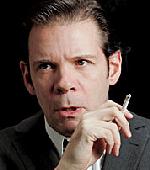SITE GUIDE
REVIEWS
FEATURES
NEWS
Etcetera and
Short Term Listings
LISTINGS
Broadway
Off-Broadway
NYC Restaurants
BOOKS and CDs
OTHER PLACES
Berkshires
London
California
DC
Philadelphia
Elsewhere
QUOTES
On TKTS
PLAYWRIGHTS' ALBUMS
LETTERS TO EDITOR
FILM
LINKS
MISCELLANEOUS
Free Updates
Masthead
Writing for Us
A CurtainUp Review
In the Matter of J. Robert Oppenheimer
by Les
Gutman
|
In order to have one-hundred-percent security, we would have to abandon all the freedoms we want to defend. ---John Lansdale, head of security for the Manhattan Project |
 T. J. Ryan
|
It's not a perfect analogy -- few are -- but it's point is well taken. Oppenheimer, who is universally credited with marshalling American physicists to create the bombs dropped on Hiroshima and Nagasaki, was deeply affected by what he and his colleagues had made possible. When it came time to work on the hydrogen bomb -- infinitely more destructive than the atom bomb -- Oppenheimer could not reconcile the project with his conscience. His loyalty was questioned, and old allegations regarding his ties to past or present Communists -- which he had never hidden -- were dredged up. Oppenheimer's recalcitrance, it was felt, gave the Russians time to play catch up in what would soon become the nuclear arms race.
The form of the play is challenging. Based on a free adaptation of the transcripts of the closed AEC Personnel Security Board hearing regarding Dr. Oppenheimer's security clearance, the script veers from the give and take of the hearing structure only rarely, to examine a few of the participants' interior thoughts. The result, then, is much like an edited replay of C-SPAN which, as we know, can contain both intriguing drama as well as dry spells. The difference, we also know, falls on the presence of a compelling star witness, and lively interaction with the interrogators.
The role of Oppenheimer belongs to Thomas Jay Ryan, in more than one sense. So masterful is his performance that it conveys more about the man even when he is not speaking than those interior monologues achieve with words. Oppenheimer was a complex creature: smart yet naïve, arrogant but self-effacing. He had a sense of loyalty, and of right and wrong, that intellectually foreclosed those which were in force at the time. In Mr. Ryan's face and body, one learns all about him one needs to know. As he sits in the hearing room listening to the damaging testimony presented against him by Edward Teller (Keith Reddin), his former colleague who went on to become the "father of the hydrogen bomb," the air in the room is electrified. There are other moments of similar intensity, but none greater.
Much of the proceeding, which is condensed from over three weeks of testimony, falls much flatter. Carl Forsman's staging more frequently reïnforces rather than overcomes the static nature of the hearing.
Nathan Heverin's handsome gray set has three tiers of seats and tables. At top are the three board members who will decide Oppenheimer's fate: Gordon Gray (Wilber Edwin Henry), its chair; Ward V. Evans (Dan Daily), a chemistry professor who is the most conflicted and interesting member as well as the lone dissenter; and Thomas A. Morgan (Peter Davies), a military industrialist. On the other two tiers are Counsel for the AEC, Roger Robb (Rocco Sisto) and his junior colleague, C. A. Rolander (Matthew Rauch), and Dr. Oppenheimer's attorneys, the animated Herbert S. Marks (Steve Routman) and Lloyd K. Garrison (Ian Stuart). Oppenheimer sits on the stage below, as will the other witnesses who testify: Colonel Boris Pash (D. J. Mendel), John Lansdale (Jonathan Hogan), Hans Bethe (Matt Fischel) and Dr. Teller. (Bethe also serves as the play's narrator.) Mr. Forsman has thus positioned the actors in such a way that they are not looking at one another, and in doing so deprives their interactions of the engagement from which they would have benefited. It's in those rare instances when the characters break out of this structure that the play takes flight.
The cast Mr. Forsman has assembled is an impressive one, made up entirely of middle-aged white men (save the somewhat younger Mr. Rauch). Of the Board members, it's Mr. Daily who gets the plum assignment; admittedly not a politician, and not even certain why he has been appointed to the Board, he exudes a perplexed scepticism to the prevailing wisdom. The laboring counsel oars are carried by Mr. Routman's barely managed combustibility as Marks and Mr. Sisto's single-minded advocacy (harboring an almost religious zealotry) as Robb. While both acquit themselves exceptionally well, both also come off as essentially two-dimensional, and the rules of engagement under which they seem to have been directed deprives us of some much-needed fireworks. The real treats in this cast, however, are provided by the four witnesses, especially Mr. Fischel's genuinely loyal and endearing Bethe, the aforementioned Teller of Mr. Reddin, and Mr. Hogan's remarkable effort as the homespun but wise Lansdale. Seemingly the true expert on matters of security, he ends the first act articulating the lesson that that goes unlearned and that persists to this day.
|
In the Matter of J. Robert Oppenheimer
Adapted by Heinar KipphardtDirected by Carl Forsman with Thomas Jay Ryan, Wilbur Edwin Henry, Dan Daily, Peter Davies, Rocco Sisto, Matthew Rauch, Ian Stuart, Steve Routman, D.J. Mendel, Jonathan Hogan, Keith Reddin and Matt Fischel Set Design: Nathan Heverin Costume Design: Theresa Squire Lighting Design: Josh Bradford Running time: 2 hours, 40 minutes with 1 intermission A production of The Keen Company Connelly Theatre, 220 East 4th Street (Avs. A/B) Telephone (212) 868-4444 Opening June 7, 2006, closes June 27, 2006 TUES - SAT @8, SUN @7; $19 Reviewed by Les Gutman based on 6/4/06 performance |

6, 500 Comparative Phrases including 800 Shakespearean Metaphors by our editor.
Click image to buy.
Go here for details and larger image.






